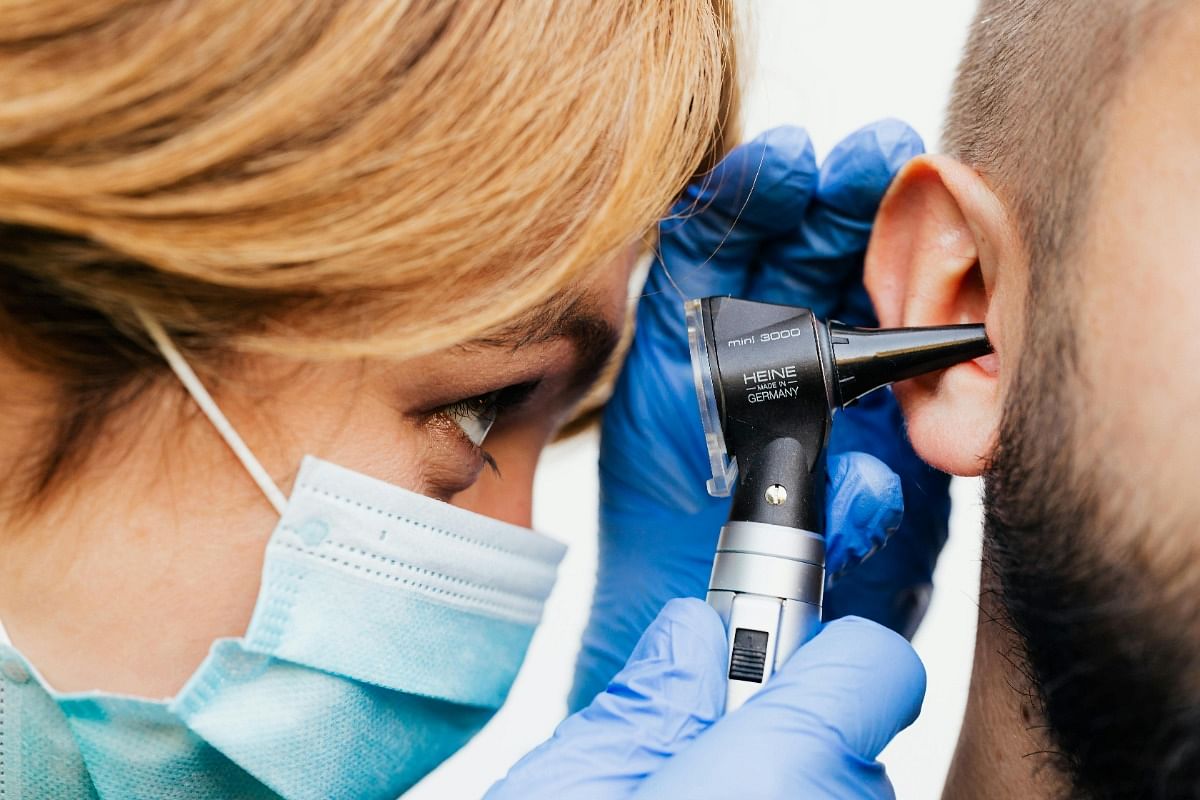Don’t Let Hearing Loss Go Unnoticed

Hearing loss often happens so gradually that people don’t realize how much it’s affecting their lives until the consequences become unavoidable. Whether it's missing important parts of conversations, constantly turning up the volume on the TV, or avoiding social situations altogether, untreated hearing loss can interfere with everyday life in significant ways. The good news is that modern hearing aids are more effective, discreet, and user-friendly than ever before. Recognizing the signs of hearing loss early and seeking professional help can preserve not only your hearing, but also your independence, relationships, and mental clarity.
At the practice of Dr. Scott Robertson, we specialize in evaluating hearing health and guiding patients through the process of selecting and adjusting to hearing aids when necessary. If you're wondering whether it's time to take that step, this blog will help you identify the warning signs and understand the benefits of seeking help sooner rather than later.
Understanding Hearing Loss: Why It Happens and Who It Affects
Hearing loss affects millions of people across all age groups, but it is especially common among older adults. According to the National Institute on Deafness and Other Communication Disorders (NIDCD), about one in three people in the U.S. between the ages of 65 and 74 has hearing loss, and nearly half of those over 75 do.
Hearing loss typically falls into one of three categories:
Sensorineural hearing loss: The most common type, usually caused by damage to the inner ear or auditory nerve. It can result from aging, noise exposure, or medical conditions.
Conductive hearing loss: Caused by obstructions or damage in the outer or middle ear, such as earwax buildup, infections, or structural abnormalities.
Mixed hearing loss: A combination of sensorineural and conductive hearing issues.
In many cases, hearing loss progresses slowly over time, making it difficult for individuals to pinpoint exactly when it started. This slow onset often causes people to adjust their behavior without realizing they are compensating for diminished hearing.
Common Signs You May Need Hearing Aids
It’s not always easy to recognize hearing loss in yourself. It can become a source of frustration for loved ones before it becomes obvious to the person experiencing it. If any of the following signs sound familiar, it may be time to consider a hearing evaluation:
1. You frequently ask people to repeat themselves. If you often find yourself saying “What?” or “Can you say that again?” during conversations, it could be due to hearing loss.
2. You turn up the volume louder than others prefer. Whether it’s the television, radio, or phone, needing the volume much louder than everyone else is a telltale sign.
3. You struggle to hear in noisy environments. Restaurants, social gatherings, or family dinners can become overwhelming when background noise makes it hard to follow conversations.
4. You have difficulty hearing on the phone. Many people with hearing loss report that voices sound muffled or distorted during phone calls.
5. You experience ringing in your ears (tinnitus). Tinnitus can be a symptom of underlying hearing damage and is often associated with sensorineural hearing loss.
6. You avoid social situations. If you feel embarrassed or anxious in group settings because you can’t hear well, hearing loss could be the reason.
7. You feel exhausted after conversations. Straining to hear and interpret sounds can be mentally draining, especially in complex listening environments.
These subtle but consistent issues may seem small at first, but they can quickly accumulate and begin to affect your personal, social, and professional life.
The Impact of Untreated Hearing Loss
Some people delay seeking help because they believe hearing loss is simply an inconvenience. However, research shows that untreated hearing loss can have serious long-term consequences:
Cognitive Decline: Studies have shown a link between hearing loss and a faster rate of cognitive decline, including conditions such as dementia and Alzheimer’s disease.
Mental Health Struggles: People with hearing loss are more likely to experience depression, anxiety, and social isolation due to the communication challenges they face.
Relationship Strain: Difficulty hearing can cause misunderstandings and frustration between family members, partners, or coworkers.
Decreased Job Performance: In the workplace, hearing loss can make communication difficult, affect productivity, and even become a safety concern.
Loss of Independence: As hearing becomes more impaired, individuals may avoid going out or engaging with others, which can lead to a decrease in physical activity and overall quality of life.
The longer hearing loss goes untreated, the harder it can be to adjust to hearing aids later, as the brain becomes less accustomed to processing sound. Early intervention can prevent many of these problems and improve long-term outcomes.
When to See an Audiologist or ENT Specialist
If you recognize any of the signs mentioned earlier, the next step is to schedule a professional hearing evaluation. At Dr. Scott Robertson’s office, we offer comprehensive hearing assessments to determine the type and extent of hearing loss. You should also consider an evaluation if:
1. You’ve noticed gradual changes in your ability to hear over the past few months or years.
2. Family members or friends have commented on your hearing.
3. You’re over age 60 and haven’t had a hearing test in the last year.
4. You’ve had significant noise exposure through work, military service, or loud hobbies.
5. You’re experiencing frequent tinnitus or ear fullness.
The evaluation includes a physical examination of your ears, pure-tone audiometry to measure hearing sensitivity, and speech testing to assess how well you understand spoken words. Based on these results, we can help determine whether hearing aids would be beneficial.
Benefits of Modern Hearing Aids
Many people still picture bulky, whistling devices when they think of hearing aids. Fortunately, technology has come a long way. Today’s hearing aids are small, powerful, and designed to work seamlessly with your lifestyle.
Some key features include:
Discreet Designs: Most modern hearing aids are nearly invisible and fit comfortably behind or inside the ear.
Rechargeable Batteries: No more fumbling with tiny batteries. Rechargeable hearing aids are convenient and eco-friendly.
Bluetooth Connectivity: Stream calls, music, and television audio directly to your hearing aids from your smartphone or TV.
Adaptive Sound Processing: Advanced hearing aids can adjust automatically to your environment, reducing background noise and enhancing speech clarity.
Directional Microphones: Focus on the sounds in front of you while minimizing noise from behind and the sides.
Using hearing aids can greatly improve your ability to engage in conversations, enjoy entertainment, and stay connected with others.
What to Expect During a Hearing Aid Consultation
Your hearing aid journey begins with a personalized consultation. At Dr. Scott Robertson’s clinic, we take time to understand your specific needs, lifestyle, and preferences. Here’s what the process typically looks like:
Comprehensive Hearing Evaluation: We test your hearing to determine your hearing profile and identify the best treatment options.
Discussion of Results: We explain your hearing test results and answer any questions about your diagnosis.
Hearing Aid Options: We review hearing aid styles, technology levels, and price ranges, helping you choose the best option.
Fitting and Customization: Once selected, we program your hearing aids to match your hearing loss and ensure a comfortable fit.
Follow-Up Appointments: We schedule visits to fine-tune the settings and ensure you’re adjusting well to your devices.
The goal is not just to hear more but to hear better. Ongoing support is essential, and we remain available for adjustments, repairs, and continued care as needed.
FAQs About Hearing Aids
No, hearing aids do not restore hearing to its original state, but they significantly improve your ability to hear and understand speech.
Today’s hearing aids are designed for comfort. Most people adjust to them quickly and report no discomfort after the first few days of wear.
With proper care, most hearing aids last between five to seven years. Regular maintenance can extend their life and ensure optimal performance.
Coverage varies depending on your insurance provider. Some plans may offer partial or full reimbursement. Our office can help you navigate your benefits.
Hearing aids require basic daily cleaning and occasional servicing. We provide guidance and support to keep your devices working properly.
Take the First Step Toward Better Hearing
If you’re struggling with hearing loss, the first step toward a better quality of life is a simple hearing evaluation. The sooner you address the issue, the easier it is to adapt and thrive with hearing aids. Whether you’re just starting to notice signs or have been dealing with hearing problems for years, help is available.
At the practice of Dr. Scott Robertson, we offer compassionate, expert care tailored to your needs. We take the time to understand your concerns, explain your options, and support you every step of the way. Our goal is to help you hear clearly and live fully.
Conclusion: Reclaim the Sounds of Life
Hearing loss doesn’t have to mean missing out on the moments that matter. With today’s technology and expert care, hearing aids offer a simple, effective solution that can transform your life. Don’t wait until the problem becomes overwhelming. Take control of your hearing health today.
Contact Dr. Scott Robertson’s office to schedule a comprehensive hearing evaluation and find out if hearing aids are right for you. Whether you’re just beginning to notice changes or ready to explore your options, we’re here to help you hear your best.



